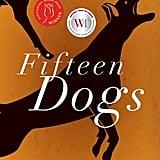

The alpha male of the pack is a mastiff named Atticus. Kim is also the name of Prince’s beloved first master with whom he is reunited in his last dream. Kim Maltman (the author of some of Prince’s poems) is a poet, mathematician, and theoretical physicist. The hidden meaning is in the sound rather than in the typography.

As an example I have highlighted the one for Bella below (in bold). Each poem embeds the name of a dog in a way that is heard in the recitation but is not obvious in print. These poems reflect Prince’s experiences and those of his pack. Oulipo uses “constrained writing techniques” related to palindromes and mathematics to release meanings through sound, rather than from the written text (“Oulipo” n. Prince’s poems use a poetic genre invented by François Caradec for the OULIPO, “the workshop of potential literature” ( Fifteen Dogs 142). Each poem poses its own questions and names one of the fifteen dogs to whom the gods have given human consciousness and language. The novel includes fifteen artful poems composed by a dog named Prince. Why is it daytime? why does night always fall? Here are a few more lines from Neruda in another translation by Leonard Durso.

Their questions, like Neruda’s, are expressed in the language of poetry. Like wandering Jews, wandering dogs answer a question with another question: Why not? The fifteen dogs of this novel, in their way, answer a question posed to them both by humans and by eternal celestial beings by posing yet other questions. Neruda’s “Ode” recalls a question posed in the Gospel of John, 9:4: “I must work the works of him that sent me, while it is day: the night cometh, when no man can work.” In his implied response to John, Neruda evokes the way the dog asks questions of his masters. Maybe it’s best to start with the poetry rather than the opening scene, which is where reviews often start, although the opening epigraph from Pablo Neruda’s “Ode to the Dog” may help: “why is there day, why must night come. It might be about the transition from the deathless Olympian gods to the Christian God who experiences death as a man. At first glance I thought it looked like a nod to The Iliad, Lord of the Flies, and maybe Animal Farm or Heart of Darkness, but it’s a much deeper book than such facile comparisons suggest. Fifteen Dogs is the winner of the 2015 Giller Prize and well worth the tribute. The first, Pastoral (2014), involved a young Priest, a sacred spring, and a cameo by talking sheep. Fifteen Dogs is the second in André Alexis’ series of five philosophical tales in the genre. As flies to wanton boys, are we to the gods, They kill us for their sport.Īn apologue is a philosophical fable often involving talking animals.


 0 kommentar(er)
0 kommentar(er)
